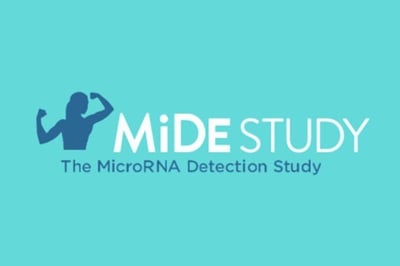Validating a Blood Test for Early Ovarian Cancer Detection in High-risk Women and Families: MicroRNA Detection Study (MiDE)

Prevention
Screening study for women with a BRCA1, BRCA2, BRIP1, PALB2, RAD51C, RAD51D, PMS2, MLH1, MSH2, MSH6, or EPCAM mutation
Study Contact Information:
Ryan Buehler (lead coordinator), midestudy@DFCI.HARVARD.edu, 617-582-8833
About the Study
The goal of MiDe is to develop a clinical diagnostic test to detect early onset ovarian cancer, as currently, there are no good screening or early detection tests available. The study is enrolling people with an with a gene linked to ovarian cancer, such as , , , , , , , , , , or . Participants can be expected to provide up to 4 tubes of blood every 6 months for up to 5 years. We can collect these samples through mobile phlebotomy all around the US. For more information, visit MiDeStudy.org.
This Study is Open To:
Adults over the age of 18 with at least one ovary intact and no personal history of ovarian cancer are invited to join the MiDe Study. Additionally, eligible adults may:
- Have an linked to ovarian cancer on genetic testing, such as , , , , , , , , , , or
- Have a blood relative who carries an found on genetic testing
- Have a family history of cancer, such as breast, ovarian, or gastrointestinal (GI) cancer(s)
If you are unsure if you may be eligible, please contact the study team.
This Study is NOT Open To:
Anyone under the age of 18 will not be considered for this trial. Adults over the age of 18 with no ovaries intact or have a personal history of ovarian cancer are also ineligible.
What the Study Involves
Participating in the MiDe Study means that you’ll:
- Review and sign a consent form
- Complete a family history questionnaire and provide updates on your personal and family history periodically throughout your time in the study
- Allow us to access your medical records for information that may be important to your participation in the study
- Provide up to 4 tubes of blood every 6 months for up to 5 years
- Allow us to collect some of your biopsy or surgery tissue samples for research, if possible
Note: Participants do not receive the results of their test.
To start, you can visit https://midestudy.org/ to get more information or follow this link to join now.
Study Investigators
Dipanjan Chowdhury, PhD: Dana-Farber Cancer Institute
Chief of the Division of Radiation and Genomic Stability in the Department of Radiation Oncology at Dana-Farber and a Professor of Medicine at Harvard Medical School
Kevin Elias, MD: Dana Farber Cancer Institute, Brigham and Women’s Hospital
Director of the Gynecologic Oncology Laboratory at Brigham and Women's Hospital, Assistant Professor at Harvard Medical School, and a visiting faculty member at the Koch Institute for Integrative Cancer Research at Massachusetts Institute of Technology
Judy E. Garber, MD, MPH: Dana-Farber Cancer Institute
Chief of the Division for Cancer Genetics and Prevention at Dana-Farber Cancer Institute and a Professor of Medicine at Harvard Medical School. She also consults with the Pediatric Cancer Genetic Risk Program at Dana-Farber/Boston Children's Cancer and Blood Disorders Center
Study Contact Information:
Ryan Buehler (lead coordinator), midestudy@DFCI.HARVARD.edu, 617-582-8833
Prevention
Screening study for women with a BRCA1, BRCA2, BRIP1, PALB2, RAD51C, RAD51D, PMS2, MLH1, MSH2, MSH6, or EPCAM mutation
Study Contact Information:
Ryan Buehler (lead coordinator), midestudy@DFCI.HARVARD.edu, 617-582-8833